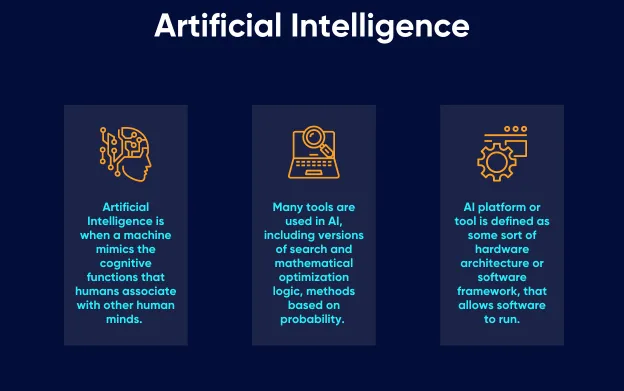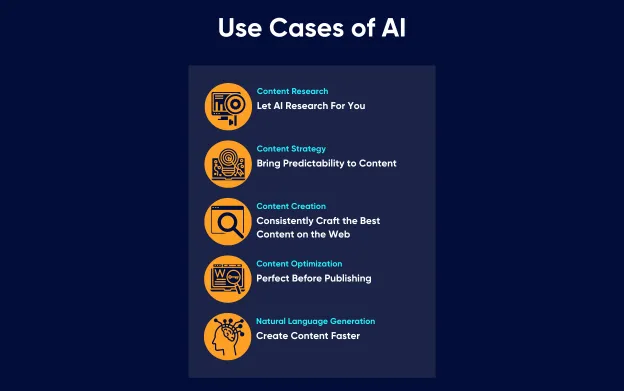AI Tools: Harnessing the Power of Artificial Intelligence
Artificial Intelligence (AI) is currently one of the hottest topics on the internet, and new AI tools pop up daily.
But why should you care?
These innovative tools are vital players in a digital revolution that’s shaping industries, businesses, and our daily lives in significant ways.
For instance, according to Gartner, 37% of organizations have already implemented AI in some form, a staggering 270% increase over the last four years. As the global AI market is projected to reach $126 billion by 2025, it’s crucial to understand how to master these powerful tools for your business.
This blog will discuss what AI tools are, best practices, and how and when to use these innovative tools.
What are AI Tools?
Artificial Intelligence (AI) tools are software platforms that employ machine learning, deep learning, and other AI techniques to automate processes, perform complex tasks, and analyze data. Among these AI techniques, generative AI stands out as it’s designed to produce new content, ranging from text to images, that wasn’t previously existing, by learning from vast amounts of data. They bring a transformative aspect to numerous industries by leveraging the capabilities of intelligent algorithms.

Several AI tools and technologies, including those powered by generative AI, have become so ingrained in our everyday lives that we may not even recognize them as AI.
Here are just a few:
Search Engines
Platforms like Google use sophisticated AI algorithms to deliver accurate and relevant search results.
Email Spam Filters
Machine learning algorithms learn from patterns in the emails you receive to filter out spam messages effectively.
Voice Assistants
Siri, Alexa, Google Assistant – all these voice-activated helpers use AI to understand and process your spoken commands, answer your questions, or perform tasks like setting reminders or playing music.
Social Media Feeds
Have you ever noticed how the content in your Facebook or Instagram feed seems tailored to you? AI algorithms analyze your behavior – what you like, share, or comment on – to show you more of what they think you’ll be interested in.
Navigation Apps
Tools like Google Maps and Waze use AI to analyze real-time traffic data.
Whether we realize it or not, these everyday tools use AI to make our lives easier.
How to Use AI In Marketing
The impact of AI tools is indeed vast and sprawling, touching upon nearly every facet of our lives and businesses.
However, for this blog, we will narrow our focus and hone in on the application of AI tools in three key marketing areas: planning, production, and personalization.

Planning
Using AI tools can enhance planning efficiency, cost-effectiveness, and precision.
Here are some examples of how to use AI for planning:
- Analyze existing online content for gaps and opportunities.
- Build media and influencer databases based on interests, audiences, and intent.
- Choose keywords and topic clusters for content optimization.
- Construct buyer personas based on needs, goals, intent, and behavior.
- Define topics and titles for content marketing editorial calendars.
Production
AI can streamline production by generating data-driven content, optimizing for SEO, and even writing drafts and briefs.
Here are some examples of how to use AI for production:
- Analyze and edit content for grammar, sentiment, tone, and style.
- Curate content from multiple sources.
- Design websites, landing pages, and calls to action.
- Optimize website content for search engines.
- Draft social media updates with copy, hashtags, links, and images.
Personalization
AI can be used for personalization by analyzing user behavior and preferences to tailor content and provide recommendations to create a more engaging and relevant user experience.
Here are some examples of how to use AI for personalization:
- Develop offers that will motivate individuals to action.
- Engage users in conversations through bots that learn and evolve.
- Optimize email send time at an individual-recipient level.
- Present personalized experiences on the web and/or in-app.
- Recommend highly-targeted content to users in real time.
Popular AI Platforms
Let’s examine some of the most popular AI tools.
Bing Chat
As Microsoft’s foray into the chatbot sphere, Bing Chat offers a robust conversational experience, handling complex queries and providing detailed responses, making it a popular choice for businesses looking to improve customer service operations.
ChatGPT
Developed by OpenAI, what sets ChatGPT apart is its ability to generate human-like text based on the prompts given to it. This feature makes it versatile for numerous applications, from drafting emails to writing code or even tutoring in various subjects.
Jasper AI
Jasper AI is an AI writing and marketing tool specifically designed for the needs of modern marketers. It excels in generating high-quality, human-like content, making it a fantastic tool for content creators, marketers, or anyone needing a helping hand with writing tasks. Its ability to create content across different formats, like blogs, emails, or social media posts, makes it a valuable addition to any writer’s toolkit.
Among these popular tools, Bing Chat stands out with its strong conversational abilities, ChatGPT stands out with its broad application range, and Jasper AI shines in content creation.
The choice between these platforms depends heavily on your specific needs and how you intend to leverage AI. Understanding these nuances can guide you in making an informed choice about the AI tools you adopt.
Tips for Using AI Tools
Now that we’ve set the stage, let’s dig into some practical advice.
To use AI tools effectively, you need a clear plan and a good understanding of the technology. Start small, pick one specific task or process you’d like to automate or enhance, and gradually expand as you gain confidence and see results.
The following are best practices for maintaining and updating your AI tools:
- Maintain balance between AI and human judgment.
- Have a clear set objective so that AI can better understand the problem at hand.
- Stay current with software updates.
- Routinely check the tool’s performance.
- Tweak parameters as necessary.
- Keep user experience in mind while using AI.
Remember, AI tools are not a set-and-forget solution—they require consistent monitoring and adjustments to ensure optimal performance.
In addition, there are potential pitfalls to be aware of when implementing AI tools. For instance, AI tools can generate inaccurate or misleading information. This could result from various factors, such as flaws in the training data or inherent biases in the algorithm.
It’s also possible that some AI tools might not have the latest information year-to-date, leading to outdated or irrelevant outputs. Therefore, it’s critical to approach AI with a realistic perspective, understanding that the tool’s effectiveness largely depends on the quality of a user’s data input and the algorithm’s sophistication. Don’t expect perfect results! All outputs must be reviewed and edited by a human.
So, while AI can do a lot, it’s not a silver bullet, and it can’t replicate a human’s nuanced insight. It can’t solve all problems and should be viewed as a tool to augment, not replace, human intelligence. Adding AI into your strategy isn’t just plug-and-play. It involves a significant learning curve and requires in-depth knowledge of the technology and how it fits in with your business objectives.
Partner With Pyxl
It’s important to remember that this blog has only scorched the surface of AI tools. Implementing and adopting AI for your business can get a bit tricky. In many cases, partnering with an agency like Pyxl allows you to maximize your results and efficiency with new tools.. Pyxl is well-versed in AI trends and the specifics of different platforms and can be your guiding light here, ensuring seamless and effective integration.
We can play a pivotal role in ensuring your business successfully harnesses the power of AI. Contact us to get started!
Updated: Sep 06, 2023
 Taylor Farace
Taylor Farace Kati Terzinski
Kati Terzinski